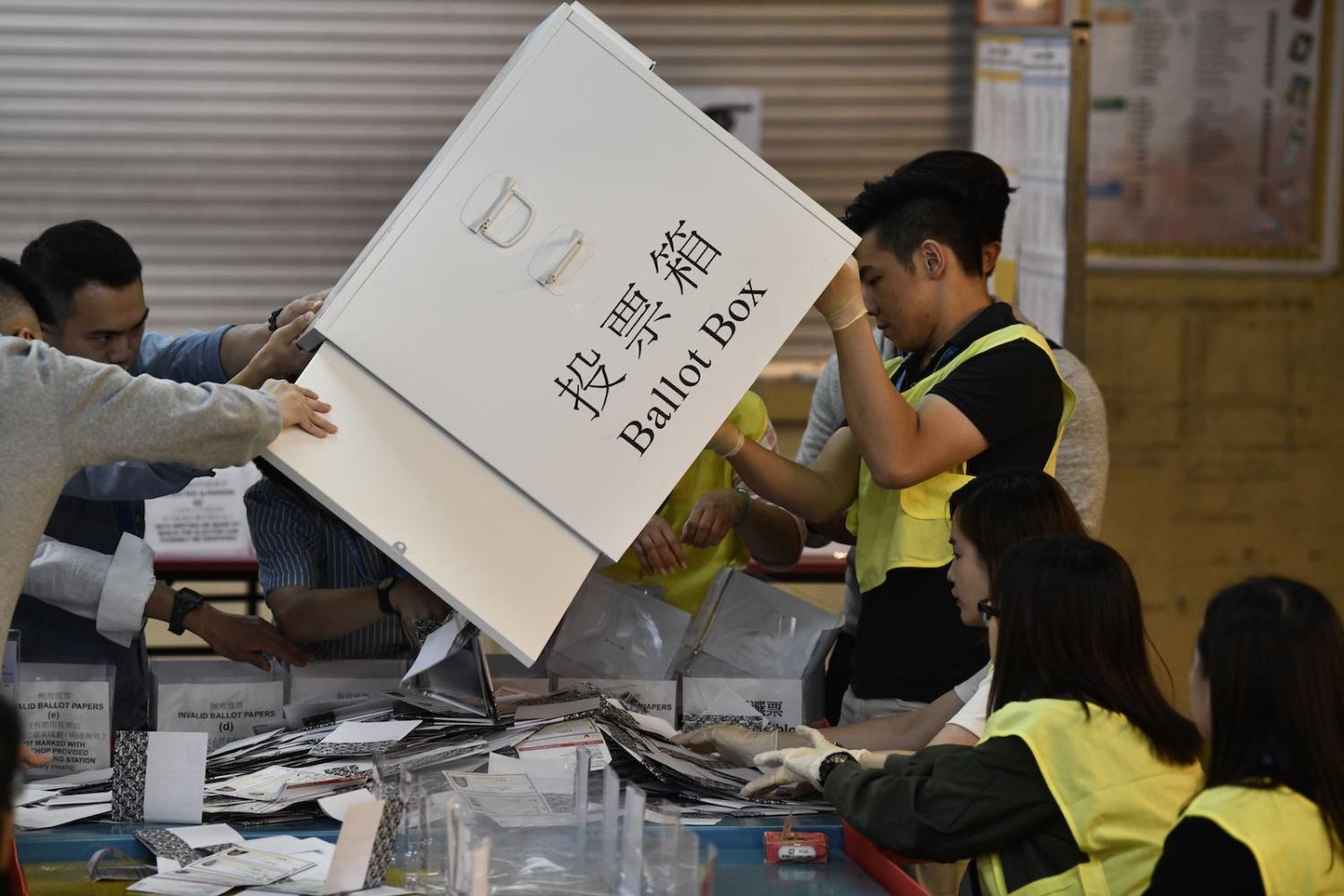On Monday evening in Hong Kong, just hours after the pro-democracy camp made global headlines with a landslide victory in the District Council election, thousands gathered in the shopping district of Tsim Sha Tsui East calling for the unconditional release of protesters remaining at the nearby besieged Polytechnic University. They occupied the road tainted by police’s tear gas from the previous week, chanting slogans and waving the protest flag that spelt out “Liberate Hong Kong, Revolution of Our Times”.
At another much quieter cordon line around the corner stood a few unmasked police officers dressed in riot gear. During a casual conversation with these seemingly much friendlier police officers on the prospect of the protests and ongoing chaos, one of them said to me helplessly: “I don’t see how this is going to end.”
Perhaps history will remember the great work of Lam, for she has achieved the impossible task of uniting Hongkongers with the crisis she single-handedly created, showing the world their determination and stamina in this ongoing battle for democracy.
I don’t either. Despite Hongkongers making history with a record turnout of 71.2% – 2.94 million registered voters – and the pro-democracy camp gaining control of the District Council for the first time, winning 388 out of 452 seats and wiping out the pro-Beijing camp, Carrie Lam, Hong Kong’s Chief Executive, still refused to admit the mistakes she’s made and rejected people’s voices. This citywide direct election has been regarded as a de facto referendum on the protests that have been developed into a movement demanding freedom, democracy, and justice.
On Tuesday, when Lam met the press for the first time after the pro-Beijing camp’s catastrophic defeat, she only claimed that she will “seriously reflect” the election results, framing the results as people’s desire to “end violence”. And as for answering people’s “five demands”, including universal suffrage, an independent probe into the police’s accountability for the excessive use of force, and amnesty for those who have been arrested, Lam’s answer was a blatant no, saying that she has already given in by withdrawing the controversial extradition bill that sparked the protests – one of the five demands – and no further concessions will be made.
Such a statement will not end the movement. In fact, Lam’s statement could be more or less a reflection of the stance of her Beijing bosses. Admitting wrongdoing has never been the style of the Chinese Communist Party and Hongkongers will need to prepare themselves for a new battle.
Reuters reported that a new crisis command centre has been set up across the border in Shenzhen, which channels messages concerning the situation of Hong Kong directly to top leaders in Beijing. Such communications channel bypasses the Liaison Office of the Central People’s Government in Hong Kong, which, in theory, plays that role since the British handed handed over to mainland China in 1997 under the one country, two systems framework. But the fatal defeat of the pro-Beijing camp in the District Council election can be interpreted as the failure of the Liaison Office, that it might have been sending inaccurate information to Beijing.
The Reuters report said that top leaders in Beijing were considering replacing the Liaison Office with the crisis command centre. This could be a sign demonstrating Beijing’s determination to have a more centralised and tighter grasp of Hong Kong affairs.

This means the pro-democracy camp will have to be ready for a bumpy ride as Hong Kong will see its Legislative Council election in September next year, and the future Chief Executive election (which will depend on when Lam will be forced to step down). The District Council has turned the pro-Beijing camp into the opposition minority, and they will put the pro-democracy camp under scrutiny. The struggles within the political system will be the new battle frontier, and how Hongkongers react will be decisive.
On the bright side, Hong Kong people’s fight for democracy has successfully put the city in the spotlight of global diplomacy. The US Congress has passed the Hong Kong Human Rights and Democracy Act in order to keep a close eye on the situation of Hong Kong, and this is a powerful message sent to the allies of the US. Hongkongers have also put up a good fight on Sunday at the District Council election, that regardless of the 6:4 proportion between the total number of votes for pro-democracy vs pro-Beijing camps, the extraordinarily high turnout rate shows Hong Kong’s great desire for democracy. Hongkongers are truly capable of expressing their views through a peaceful and rational election despite the ongoing demonstrations that have been descended into violence and chaos caused by both the police and protesters.
Perhaps history will remember the great work of Lam, for she has achieved the impossible task of uniting Hongkongers with the crisis she single-handedly created, showing the world their determination and stamina in this ongoing battle for democracy. With nearly 10,000 tear gas canisters fired by the police, countless injuries and deaths, plus more than 5,000 arrests of protesters as young as 12 years old, the people of Hong Kong will remember that the results of this election were paid with the high price of physical and emotional traumas they have endured for the past six months. And as many frontline protesters are those who are still too young to vote, they will grow and continue to fight for their rights, and they will not cease until their demands are met.

